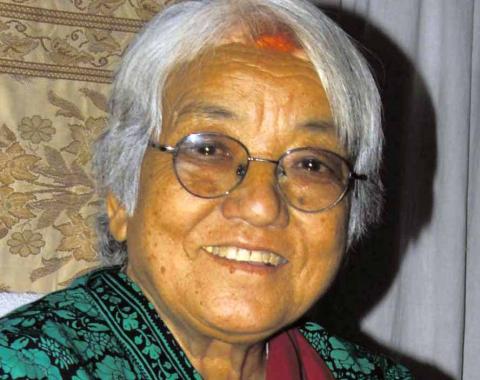Bhadra Ghale Seeking Life in Art and Poems (Book Review)
 Shyam Rimal (Kathmandu) / June 23: She is a politician, a social worker, a litterateur and a painter.
Shyam Rimal (Kathmandu) / June 23: She is a politician, a social worker, a litterateur and a painter.
Bhadra Kumari Ghale who went to Binita Gandhi Ashram in Wardha in Maharashtra, India, for the five-year scholarship of the Government of Nepal, took nursing and midwifery nurse training and served at Janaki Public Hospital in Janakpur, Nepal.
After she completed her Shastri (Bachelor in Sanskrit) studies from Kashi Vidyapeeth in Benarus, India, she entered Nepali politics and became Rastriya Panchayat member, minister and the even the member of the Rajsabha Standing Committee (privy council).
Presently known more as a social worker than a politician, she had started painting and composing poems when she was in India some sixty years ago. She painted at day time and wrote poems on them at night when she had to remain there also for her treatment of tuberculosis. Art and poems came to her rescue as a meaning of life when she was attacked by tuberculosis three times. Now at 86, she has already published 101 books including poems, essays as well as a Veda (scripture) of the Gurung community.
Her latest book ‘Art and Life’ is full of paintings and poems in an enormous size. The work which has 190 arts, as many poems and their explanation in Nepali as well as translation in to English, is in coffee-table size. The book has 382 pages.
The poems delve into nation, nationalism, nature, hopes and hopelessness in life, women, man-woman relationship, family sorrows of women and compulsion, criticism of the male-dominated city, religion, humanity, prayers, wayward youthfulness, development, suffering in cities after coming from villages, repentance, drug addiction, alcoholism and smoking etc.
A lifelong unmarried woman Ms Ghale also mentions the glory of being a mother. She has much veneration to the Indian leaders of the time like Sarbapalli Radhakrishnan, Dr. Rajendra Prasad, Jawaharlal Nehru, Lal Bahadur Shastri, World Poet Rabindranath Tagore, Mahatma Gandhi’s wife Kasturba, Indira Gandhi, among others, who find mention in her four-line single stanza of the poem. But the poems are not epigrams. The poems effectively describe the paintings in both Nepali and English.
She reminds the traditional responsibility of women and stresses on the need of male- female union if we are to win the world. :
Woman’s responsibility is home, food and kitchen
Woman is mother, a housewife and she has to handle the household chore
There is right identity of woman’s life at home
Caring, nourishing and running the home is woman’s responsibility !
She also reminds the repentance of a village girl coming to town:
Where I started and where I came ?
And mixed up in modernity as I shunned village culture
Forgot the clan and prestige, allured of good food and nice clothing
Where did I swung now, where was I entrapped?
Her paintings are based on household colours such as kohl, red clay, vermilion, geru, green leaves, neer, and black remains of kerosene lamp and turmeric etc, as she had no money to buy expensive colours. Some of her art are close to the Mithila art, such as – long nose and big eyes. These paintings are both realistic and abstract.
The translation of the work by Senior Executive Editor at RSS Tirtha Bhattarai, also an experienced translator taking almost a year in 2015 ( the year when April 25 earthquake struck the country) to 2016, are based on the sentiment of the poems and are easy to comprehend. The foreword by poet Manjul has added gravity to the work.
One finds it quite indigestible when s/he finds print mistakes at various places in the work printed in very expensive glossy paper. Although the poems are quite sentimental, there is a lack of maturity in writing style.
The price of Rs. 2500 seems more targeted at foreign readers than Nepali readers by a writer who is admired for her big heart. We can expect of immortality of the work if the poems are rewritten and mistakes are corrected. RSS
